Politics
Is this the budget Britain needs? Our panel responds | Polly Toynbee, Frances Ryan, Sahil Dutta, Sharon Graham, John Redwood and others

Polly Toynbee: This was radicalism disguised as conservatism

Here comes Labour defining itself at last with the biggest tax-raising budget in a lifetime: the £70bn in new spending – with £40bn coming from raised taxation – is big enough to see from space. This should lift the public mood, after the chancellor committed to economic change with her “invest, invest, invest” message. She demolished the Tory legacy after the OBR’s verdict: they had hidden debts – and now they have run for the hills. Her tone of authority rang out to the markets, responding at first by setting their prices in her favour. Then they wavered: will they settle?
The rich got their noses pinched, and were scorched for their private jets, private schools, capital gains and non-dom status, while losing inheritance tax perks on pension pots and farmland. These crowd-pleasers that polled very well would have made the “intensely relaxed about the filthy rich” Blair government faint with shock. How cleverly the stolid Reeves-Starmer show of sober solidity disguised their radicalism in a generally market-calming performance. Mind you, her speech didn’t talk of squeezing the rich till the pips squeak (these were only minor pinches to their wallets). We know now who Labour thinks working people are, protecting them with no rise in fuel tax, 1p off a pint in a pub, and no change to income tax or national insurance thresholds: pretending they might continue freezing those thresholds for working people was a clever pre-budget feint.
The great taxation, the springboard out of austerity, takes most from larger businesses so that small hairdressers or corner shops with four or few employees are saved from higher national insurance contributions. The eye-watering sum raised for the NHS must yield falling waiting lists fast: almost everything for Labour depends on this. Schools get a welcome lift. There’s little for the poor box: wait for that taskforce report in the spring spending review, they say. Then they must remove the two-child cap. For now, change needs to show itself soon to raise the spirits of a glum and cynical public. But everyone now knows the true nature of this government.
Frances Ryan: Forget the election campaign – tax is no longer a dirty word for Labour

It is an age-old truth that the purpose of a Labour government is to clear up the Conservatives’ mess. For the party’s first budget in nearly 15 years, the chancellor, Rachel Reeves, had two dilemmas: how is Labour going to rebuild Britain – and who is going to pay for it?
Forget the tight-lipped election campaign, taxes are no longer a dirty word. They will boost the minimum wage, help the broken special educational needs and disabilities (Send) system and pay for breakfast clubs for kids. The flatlining NHS will get £22bn worth of CPR.
Reeves targeted those with the broadest shoulders through capital gains and inheritance tax changes, while lifting the freeze for middle earners. But she missed the chance to raise cash from a wealth tax. Polling by YouGov before the budget found eight in 10 Britons support raising income tax for the super-rich.
Large-scale investment in infrastructure will be a lifeline for a country that’s crumbling. But meagre 1.5% raises for government departments expose a spending double standard: it’s prudent to fix a road but wasteful to ease child poverty.
Reducing debt repayments from universal credit will be welcomed but knowing that changes to the work capability assessment are to come means an anxious wait for many disabled people.
Much punditry today will focus on whether Reeves has broken Labour’s manifesto tax pledge. But that’s a distraction. The real issue is not the semantics of who is or isn’t a “working person”. It’s what is a fair way to rebuild a broken public realm.
Now the maths is done, Labour will need to sell the narrative it should have started with in the election: tax is not a burden – it’s the price of Tory failure.
Sahil Dutta: A crucial question – who will own this new infrastructure?

Despite progress on public investment, Labour’s budget still reflects a failed status quo. The £40bn increase in tax is needed but falls more on businesses employing people than it does the wealthy hoarding economic resources.
Rejecting broader questions of how money is made in the economy and by who, Labour instead treats infrastructure investment – especially housing, transport and energy – as the ultimate problem to solve. After three decades when Britain has invested less than its G7 partners, it is right to address this. But how investment happens is as important as how much.
Here Labour has shown little sign of changing the current model where critical infrastructure is provided by private firms. Many of these companies have shunned investment for the past three decades, while ramping up dividends, buybacks and executive pay. Rather than confront why, Labour’s priority seems to be sweetening investors and developers with more money available on better terms.
This is what drives Rachel Reeves’s new “investment rule”. That an accounting tweak can suddenly release £50bn for public investment shows how political “economic realities” really are, but the updated framework still restricts extra fiscal capacity to subsidising capital projects.
By excluding “day-to-day” spending, Labour has undervalued our social infrastructure. Work in sectors such as healthcare, childcare, education and adult social care is as vital for a functioning economy as new train lines and energy plants. What use are new machines in the NHS when hospitals are filled with elderly patients needing community care? Though these essential services have gained today, their forecasted budgets are very tight.
It is telling that many of these essential services – staffed by Britain’s 21st-century working class – will scrap for support while the big business suppliers of capital infrastructure projects can look forward to more subsidies. If the budget is a window into where power lies in the country, this shows how far Labour has to go.
John Redwood: The intentions are good, but can Starmer and Reeves deliver?

Many of us welcome and support the main budget aims of securing more growth, making good investments and helping more people into work. The question is: will the many tax rises and spending increases achieve the desired results?
In order to achieve the government’s growth ambitions through increased investment there needs to be a big uplift in private sector investment, alongside new government projects. That, in turn, requires a competitive tax regime as the UK seeks to attract crucial investment from around the world. It also needs a way of taxing the wealthy and successful to ensure, as now, they pay substantial tax without setting rates and rules that lead to many of them leaving the country. Ahead of the budget, we read that many very rich non-doms left, taking their businesses and spending power with them. We cannot afford to lose too many from our talent pool.
The strategy based on a big expansion of public sector investment needs to be carefully planned and executed. Doubtless more AI and computers could raise standards and reduce costs, but we do not need another very expensive computerisation scheme like the Post Office one, which landed the taxpayer with huge bills for compensation. The idea that the state should put £19bn into carbon capture and storage worries true green campaigners, and leaves the rest of us concerned that this will not be an investment that will pay a return. Trying to rescue HS2 as a new link to the north could prove to be costly and difficult, as it has defeated the well-paid management so far to deliver it on time and anywhere near the original large budget.
Many of the projects the government brings forward will be familiar: the announced improvements to schools and new hospitals (which the last government said it wanted but did not get done) are presumably there with some advanced plans. I wish them well in trying to get us more energy, better schools and hospitals, and a rail system that pleases the passengers; but Keir Starmer and Rachel Reeves are going to need new thinking on how to manage these matters, and some better public sector managers to carry them through.
Sharon Graham: It’s disappointing Labour didn’t adopt our proposal for a wealth tax

There are some positive announcements, no doubt. For instance, the increases in government spending, a decent increase to the minimum wage, and a loosening of the fiscal rules – a move I have been calling for these past months – so we can borrow to invest. But for everyday people to feel change, a much clearer timeline of concrete action will be needed.
Here is the real challenge this government faces. How does it deliver a serious industrial strategy that creates jobs and supports communities? On investment, the chancellor still left the fundamental question unanswered. Where are the 650,000 green jobs? Too much is left unknown.
Investment can’t end up being a handout for multinational banks and corporations, with no job guarantees attached. That doesn’t work. It isn’t working with the PetroChina and Ineos oil refinery at Grangemouth.
That’s the cold, hard truth about the world we now live in. A world in which billionaires and global markets have the whip hand. They couldn’t care less about UK infrastructure, about our jobs and communities.
But governments should and could do more. They can use the resources they have to take stakes and drive investment – to lead, not just follow, the market.
On public services, this budget marked the beginning of a long path towards renewal. Substantial investment in education and our NHS is to be welcomed. But we need to make sure that the investment is in people, not just technology. Scanners without staff are of no use.
The government chose not to bite the bullet and adopt our proposal for a wealth tax. Instead of raising corporation tax to 28%, as we had proposed (and as Kamala Harris is proposing for the US), the government has gone for the backdoor option of a company NI rise, knowing that many employers will pass it on to their workers.
What workers expect from a Labour government is to use all the power it has to fight their corner and truly be their voice. That’s the test Labour faced in this budget, and that’s the test it will face through the next five years. They may only have one shot. They need to make it count.
Sharon Graham is the general secretary of Unite
Brian: There’s nowhere near enough help for people living in poverty
Today’s autumn budget was an opportunity for the new Labour government to show it is determined to help and support people living on low incomes. Far from that, the focus on “working people” excluded and alienated disabled people, and those unable to work due to health conditions, who already are living on benefits that are inadequate. As a single parent unable to work, and claiming universal credit, I know how difficult it is to try to make these payments stretch while living in poverty.
While the announcement of lowering the maximum debt deductions from universal credit – going from 25% to 15% – is welcome, this is still far too much for people living on the lowest incomes. Similarly, raising the earnings threshold for carer’s allowance and extending the household support fund are positive steps, but they do not tackle the core issues of inadequacy within our social security system. Clear opportunities were missed: the removal of the two-child limit policy, if carried out, would lift more than 500,000 children out of poverty.
If the government intends to invest in the future of this country, it should start by helping struggling families like mine. Announcements like the increase of 50% on the bus fare cap does the opposite: hitting people on low incomes hardest.
-
Brian is a parent taking part in Changing Realities, a collaboration between parents and carers living on a low income, researchers at the University of York and Child Poverty Action Group
Politics
Rachel Reeves’s big tax-and-spend budget dissected – podcast | Autumn budget 2024

On Wednesday the chancellor, Rachel Reeves, set out the Labour government’s debut budget in parliament. She told the House of Commons that Labour would “rebuild Britain”, promising more money for the NHS, schools and public transport.
“In 1945 it was the Labour party that rebuilt our country from the rubble of the second world war. In 1964 it was the Labour party that rebuilt Britain with the white heat of technology. And in 1997 it was the Labour party that rebuilt our schools and hospitals,” she said. “Today, it falls to this Labour party, to this Labour government, to rebuild Britain once again.”
Spending will rise by about £70bn a year, funded by borrowing and tax increases, according to the Office for Budget Responsibility.
“It feels like a big budget to me,” the Guardian’s special correspondent Heather Stewart tells Helen Pidd. “It feels like a really historic moment. I’ve covered a lot of budgets going back 20 years and more, and it’s huge in terms of the increase in taxes and spending and borrowing. It’s a kind of old-fashioned tax-and-spend budget in a way.”
Support the Guardian today: theguardian.com/todayinfocuspod

Politics
How Donald Trump Is Making Big Promises to Big Business
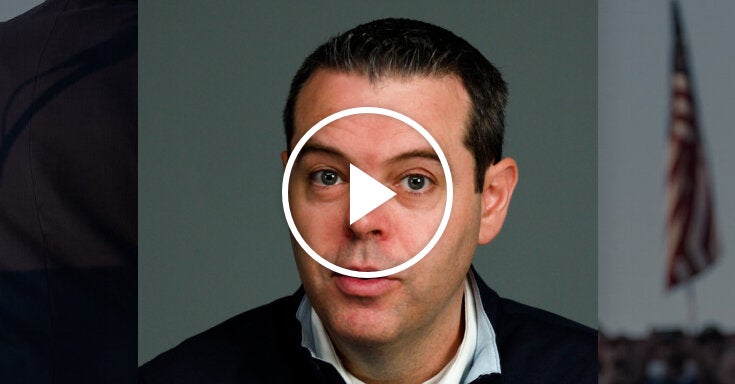
Crypto. Big Oil. Tobacco. Vaping. Former President Donald J. Trump has been making overt promises to industry leaders. Shane Goldmacher, a national political correspondent for The New York Times, explains.
Politics
Carers’ earnings limit to rise by £45 a week after allowance scandal | Society

The earnings limit placed on people who claim government support for taking care of disabled, sick and elderly loved ones will rise by £45 a week, the chancellor has announced, after a six-month Guardian investigation into the carer’s allowance scandal.
The changes will enable full-time unpaid carers who provide care for at least 35 hours a week to earn up to £196 a week from next April without forfeiting carer’s allowance benefit, currently £81.90 a week.
The move has been welcomed by campaigners and carers who said it would make “a massive difference” to helping them keep a toehold in the job market.
The Guardian uncovered the scandal at the heart of the Department for Work and Pensions (DWP) in which thousands of carers were being forced to repay life changing sums of money, and in some cases being left with criminal records after being prosecuted for minor and unwitting breaches of carer’s allowance earnings limits.
One unpaid carer, Debbie Wilman, 63, who had to repay £900 in overpayments accrued mistakenly while she juggled her part-time cleaning job with caring for her 87-year-old mother, said her immediate reaction to Reeves’s announcement was: “Wow!”
Wilman, a cleaner on a zero-hours contract at a Wetherspoon’s pub in Stockport, Greater Manchester, said the ability to earn an extra £45 a week – or about £2,340 a year – without being penalised would “make a massive difference” to unpaid carers.
“It will be a huge help although very few carers can actually earn that amount because they don’t have the time [because of their caring responsibilities],” she said. “But it certainly takes the pressure off.”
Helen Walker, the chief executive at Carers UK, said: “This is a vital poverty prevention measure helping many carers, particularly women, stay in the labour market … It will help to put much needed cash into the pockets of working carers who do so much to look after their disabled, ill and older relatives.”
The change, announced by Reeves in her budget speech, is the biggest increase in the carer’s allowance earnings limit in the benefit’s 48-year history. The change will peg the carer’s allowance earnings limit to 16 hours a week at the “national living wage”.
The chancellor confirmed a government review of carer’s allowance would look at removing “cliff edge” penalties that in effect fine claimants a whole week of carer’s allowance for overstepping the earnings limit by even a penny.
The changes would give unpaid carers – 70% of whom are women – greater flexibility to work and increase their financial security while allowing them to continue to claim carer’s allowance, the Treasury said.
The move reverses a five-year trend in which the earnings limit has fallen behind the national living wage. In 2019 carers could work 15 hours a week at the national living wage, but this had fallen to just over 13 hours by April, in effect reducing unpaid carers’ earnings potential by 13 days a year.
after newsletter promotion
Recent research by the charity Carers UK found four out of 10 unpaid carers had given up work because of fears they would breach carer’s allowance rules, while nearly two-thirds said they were prevented from working more by earnings restrictions.
The budget announcement comes a fortnight after the work and pensions secretary, Liz Kendall, announced an independent review into carer’s allowance after the Guardian’s campaign. It will look at ways to improve the management of the benefit to prevent overpayments.
The draconian penalties for breaching carer’s allowance earnings limits are notorious: going just £1 over means the entire benefit must be repaid. A carer who earned £1 more than the current £151 limit across 52 weeks, then, would pay back not £52 but £4,258.80.
Last year about 34,500 claimants were repaying carer’s allowance overpayments – about £250m in total – latest figures show. Campaigners say the failure of the DWP to alert carers to earnings breaches meant many unwittingly ran up huge overpayments.
Davina Ware, 67, a carer who was left devastated after inadvertently running up nearly £4,000 in overpayments, said the review must explain why the DWP waited for years before notifying thousands of carers they had fallen foul of earnings rules. “They need to haul the DWP over the coals for that,” she said.
Politics
This is not a Budget I want to repeat, says Rachel Reeves

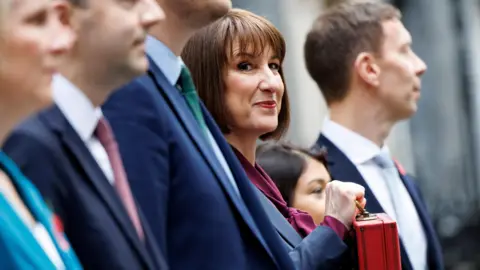 EPA
EPAChancellor Rachel Reeves has told the BBC that she hopes Labour’s first Budget since taking power, which includes massive tax increases, would be a one-off.
“This is not the sort of Budget we would want to repeat,” she told the BBC’s political editor Chris Mason.
“But this is the Budget that is needed to wipe the slate clean and to put our public finances on a firm trajectory.”
Employers will bear the brunt of the £40bn in tax rises unveiled earlier by Reeves – the biggest increase in a generation.
She insists it is needed to plug a £22bn “black hole” in the nation’s finances she inherited from the Conservatives and to invest in the NHS and other public services.
In a marathon 76 minute speech, she said Labour would fulfil its promise to voters in July’s election to “invest, invest, invest” to “drive economic growth”.
But the government’s promise to make the UK the fastest growing economy in the developed world have been undermined by its own financial watchdog.
The Office for Budget Responsibility said the package of economic measures unveiled by Reeves would ultimately “leave GDP largely unchanged in five years”.
Asked about the underwhelming forecasts, she said: “I absolutely accept this is not summit of my ambitions. I want the economy to grow faster than this.”
She added that the “growth numbers this year and next year are being revised up and that’s good news”.
The OBR says the economy will grow by 2% in 2025, up 0.1% in its previous forecast, but it will drift down in subsequent years to 1.5% in 2028.
In her Budget speech, Reeves said “working people” would not see an increase in income tax, National Insurance or VAT, fulfilling a promise made by Labour at the general election.
Instead, employers will see an increase in National Insurance contributions on their workers’ earnings which will raise up to £25bn a year for the government.
There will also be an increase to capital gains tax on share sales and a freeze on inheritance tax thresholds.
In his response to the Budget, Conservative leader Rishi Sunak accused Reeves of “hobbling” economic growth.
“They’re taxing your job, they’re taxing your business, they’re taxing your savings. You name it, they’ll tax it,” Sunak told MPs in his final Commons appearance as leader of the opposition.
But Reeves claimed any “responsible chancellor” would have been forced to do the same to “fix the foundations” of the economy.
Her Budget – the first Labour economic statement since 2010 – sees the second biggest increase in taxes in UK history.
As measured by amount of tax raised relative to the size of the economy, it is slightly smaller than Conservative Chancellor Norman Lamont’s 1993 Budget.
In a surprise move, Reeves decided not to continue a freeze on income tax thresholds beyond 2028, which would have dragged millions of people into the tax system for the first time or pushed them into paying higher rates.
And she announced changes to Labour’s self-imposed borrowing rules to allow the government to pump billions into the UK’s infrastructure and fund improvements to crumbling schools and hospitals.
She also froze petrol duty for next year – and retained a 5p cut introduced by the Tories that was due to expire in April.
Other measures included:
- Capital gains tax paid on profits from selling shares to increase from up to 20% to up to 24%
- Freeze on inheritance tax thresholds extended beyond 2028 to 2030
- VAT on private school fees from January 2025
- Air Passenger Duty on flights by private jet to go up by 50%
- New tax of £2.20 per 10ml of vaping liquid introduced from October 2026
- Tax on tobacco to increase by 2% above inflation, and 10% above inflation for hand-rolling tobacco
- Tax on non-draught alcoholic drinks to increase by the higher RPI measure of inflation, but tax on draught drinks cut by 1.7%
- The stamp duty land tax surcharge for second homes will increase by two percentage points to 5% from Thursday
In what was the first Budget speech by a female chancellor in the UK’s history, Reeves told MPs: “This is a moment of fundamental choice for Britain.
“I have made my choices. The responsible choices. To restore stability to our country. To protect working people.
“More teachers in our schools. More appointments in our NHS. More homes being built.
“Fixing the foundations of our economy. Investing in our future. Delivering change. Rebuilding Britain.”
But leading business groups said the Budget was a “tough” one for business, pointing to the NI hike as a blow to the ability of firms to invest.
“At first blush, there is precious little in the government’s first Budget which offers anything other than short-term pain,” said Roger Barker, director of policy at the Institute of Directors.
The Liberal Democrats welcomed the extra money for the NHS “to start repairing all the damage done to local health services by the Conservatives”.
But leader Sir Ed Davey said: “Raising employer’s National Insurance is a tax on jobs and high streets, and it will make the health and care crisis worse by hitting thousands of small care providers.”
Scotland will receive an additional £3.4bn in Treasury funding as a result of the Budget.
First Minister John Swinney has been calling for the UK government to “immediately and significantly” increase funding for Scotland.
The SNP government has already cut £500m from its budget this year, with ministers warning that without extra cash they would need to make difficult choices when they set out their tax and spending plans for next year in December.
Politics
Farmers “betrayed” by Labour’s £1m inheritance tax relief limit
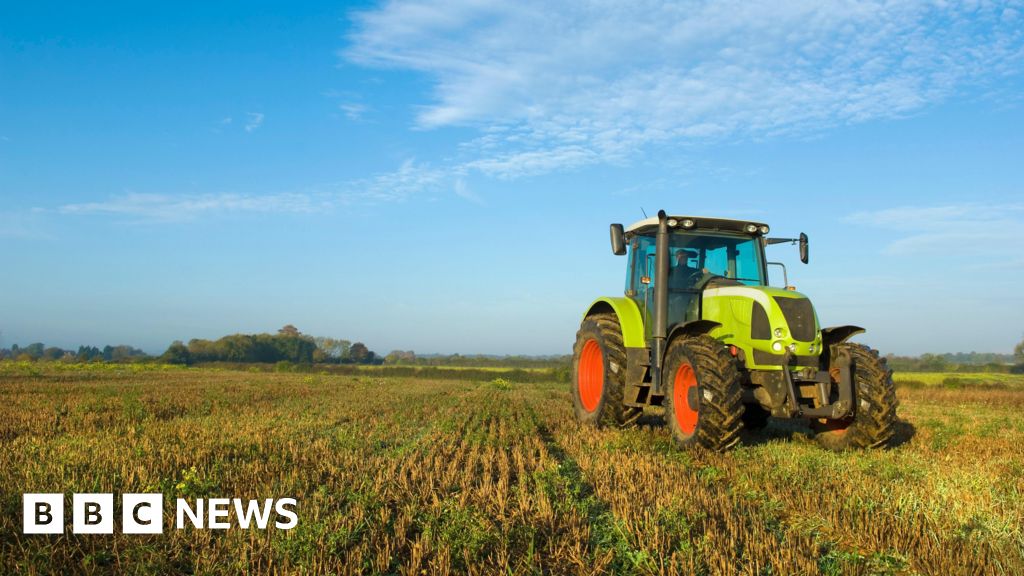
Farmers across the UK have met the news that inheritance tax relief for farms will be limited to £1m with anger.
The National Farmers’ Union said it had been a “disastrous budget” for family farms, that would “snatch away the next generation’s ability to carry on producing British food” and see farmers forced to sell land to pay the tax.
Many have gone onto social media to express their dismay, as well as broadcasters Jeremy Clarkson and Kirstie Allsopp, who said the decision showed the government had “zero understanding of what matters to rural voters”.
The government said it was still committed to supporting farmers and “the vital role they play to feed our nation”.
In Wednesday’s budget, the Chancellor announced that, while there would continue to be no inheritance tax due on combined business and agricultural assets worth less than £1m, above that there would be a 50% relief, at an effective rate of 20%, from April 2026.
For years, the APR tax relief has enabled small family farms – including land used for crops or rearing animals, as well as farm buildings, cottages and houses – to be handed down through the generations.
Somerset farmer Richard Payne told the BBC that he had already told his son to think of going into something other than farming, as the business would become “completely unviable” as a result of inheritance tax.
He added that the £1m limit would only cover the smallest farms and that the change could result in more land being bought up by bigger businesses, changing the future shape of UK farming.
“Right across the land there will be a sea-change for the worse. Everyone says they don’t like mega-farms and they don’t want factory farming, but I can see that will be one answer out of all of this,” he explained.
Fellow Somerset farmer Holly Purdey, who is vice-chair of the Nature Friendly Farming Network England, said “longevity and generational thinking” were often key motivators for farmers to care for the land – and that could be lost.
But, she added, any forced sale of land from larger farms as a result of the tax relief changes could help more newcomers get into farming.
On X, many farmers said the decision would mean the end of smaller family farms.
Jeremy Clarkson, who presents the TV programme Clarkson’s Farm, posted – telling farmers not to despair but “just look after yourselves for five short years and this shower will be gone”.
Broadcaster Kirstie Allsopp said the Chancellor had destroyed farmers’ “ability to pass farms onto their children, and broken the future of all our great estates”.
“It’s an appalling decision which shows the government has zero understanding of what matters to rural voters,” she added.
Shadow secretary of state for rural affairs, Steve Barclay, said on X that Labour had “broken a clear promise they made to our farmers” by changing the tax relief.
Victoria Vyvyan, president of the Country Land and Business Association, said the change was “nothing short of a betrayal”, as Secretary of State Steve Reed had last year said: “We have no intention of changing APR.”
She added that it was estimated 70,000 farms could be adversely affected by the £1m cap: “This puts dynamite beneath the livelihoods of British farming, and flies in the face of growth and investment.”
Tom Bradshaw, president of the NFU, said: “It’s been a disastrous budget for family farmers.
“The shameless breaking of clear promises on agricultural property relief will snatch away the next generation’s ability to carry on producing British food, plan for the future and shepherd the environment.”
But the government said the change was only expected to affect around 2,000 estates each year.
Following Wednesday’s budget announcement, the government said it would be maintaining the £2.4bn farming budget for England in 2025/26.
Food Security Minister Daniel Zeichner said: “Our commitment to farmers and the vital role they play to feed our nation remains steadfast.”
Politics
Stamp duty tax on second homes to rise

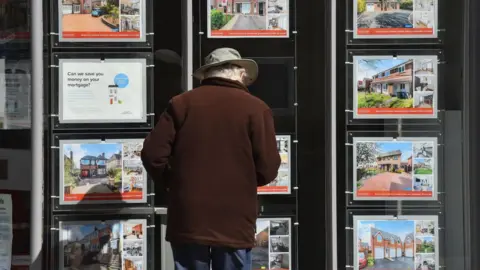 Getty Images
Getty ImagesThe rate of stamp duty paid by people buying a second home is to rise, Chancellor Rachel Reeves has announced in the Budget.
Stamp duty is a tax paid when buying property over a certain price in England and Northern Ireland.
People buying an additional property are already subject to a higher rate, and from Thursday this will rise from from an extra 3% to 5%.
Reeves said the move would “support over 130,000 additional transactions from people buying their first home, or moving home, over the next five years”.
However, analysts say the increase rate could affect landlords’ willingness to buy more properties.
Paul Johnson, director of the Institute for Fiscal Studies think tank, said renters would “pay part of the cost” of the increase in stamp duty for second-home buyers and landlords “as the supply of such properties falls”.
Ben Beadle, chief executive of the National Residential Landlords Association, said: “The chancellor has failed to heed the warnings of the Institute for Fiscal Studies that higher taxes on the rental market lead only to rents going up.
“What tenants needed was a Budget to boost the supply of new, high-quality rental housing. What we got is a recipe for less choice and higher rents.”
But Ben Twomey, chief executive of campaign group Generation Rent, said: “Renters who have been able to save a deposit to buy a home will get a boost from the increased stamp duty surcharge.
“The higher costs for investors will make it easier for first-time buyers to compete in the house sales market.”
Currently, buyers of homes worth less than £250,000 do not pay stamp duty. This was doubled from £125,000 under Liz Truss’s mini-Budget in September 2022.
The threshold is £425,000 for those buying their first property, with the level raised from £300,000 in the mini-Budget.
However, next March the thresholds are due to revert back to the lower levels set before the mini-Budget.
The current rates of stamp duty are:
- £0-£250,000 (£425,000 for first-time buyers) = 0%
- £250,00-£925,000 = 5%
- £925,001-£1.5m = 10%
- £1.5m+ = 12%
From Thursday, people buying a second home will pay an extra 5% on top of this.
Meanwhile, the Budget included a £500m boost in funding for the Affordable Homes Programme, which the government said would deliver up to 5,000 new social and affordable homes.
Reeves also confirmed the government would reduce Right to Buy discounts in a bid to increase the supply of council housing.
The Right to Buy scheme allows tenants renting council-owned homes to buy them at a discounted rate.
The chancellor said councils would also be able to keep 100% of the money raised from sales of housing so this could be reinvested into new supply.
-

 Science & Environment1 month ago
Science & Environment1 month agoHow to unsnarl a tangle of threads, according to physics
-

 Technology1 month ago
Technology1 month agoIs sharing your smartphone PIN part of a healthy relationship?
-

 Science & Environment1 month ago
Science & Environment1 month agoHyperelastic gel is one of the stretchiest materials known to science
-

 Science & Environment1 month ago
Science & Environment1 month ago‘Running of the bulls’ festival crowds move like charged particles
-

 Technology1 month ago
Technology1 month agoWould-be reality TV contestants ‘not looking real’
-

 Science & Environment1 month ago
Science & Environment1 month agoMaxwell’s demon charges quantum batteries inside of a quantum computer
-

 Science & Environment1 month ago
Science & Environment1 month agoX-rays reveal half-billion-year-old insect ancestor
-

 Science & Environment1 month ago
Science & Environment1 month agoSunlight-trapping device can generate temperatures over 1000°C
-

 Technology1 month ago
Technology1 month agoUkraine is using AI to manage the removal of Russian landmines
-

 Sport4 weeks ago
Sport4 weeks agoBoxing: World champion Nick Ball set for Liverpool homecoming against Ronny Rios
-

 Science & Environment1 month ago
Science & Environment1 month agoLiquid crystals could improve quantum communication devices
-

 Technology1 month ago
Technology1 month agoRussia is building ground-based kamikaze robots out of old hoverboards
-

 Technology4 weeks ago
Technology4 weeks agoGmail gets redesigned summary cards with more data & features
-

 Football4 weeks ago
Football4 weeks agoRangers & Celtic ready for first SWPL derby showdown
-

 Science & Environment1 month ago
Science & Environment1 month agoLaser helps turn an electron into a coil of mass and charge
-

 Science & Environment1 month ago
Science & Environment1 month agoPhysicists have worked out how to melt any material
-

 Science & Environment1 month ago
Science & Environment1 month agoQuantum ‘supersolid’ matter stirred using magnets
-

 TV4 weeks ago
TV4 weeks agoসারাদেশে দিনব্যাপী বৃষ্টির পূর্বাভাস; সমুদ্রবন্দরে ৩ নম্বর সংকেত | Weather Today | Jamuna TV
-

 Technology4 weeks ago
Technology4 weeks agoSamsung Passkeys will work with Samsung’s smart home devices
-

 Sport4 weeks ago
Sport4 weeks agoAaron Ramsdale: Southampton goalkeeper left Arsenal for more game time
-

 MMA4 weeks ago
MMA4 weeks agoDana White’s Contender Series 74 recap, analysis, winner grades
-

 Science & Environment1 month ago
Science & Environment1 month agoA new kind of experiment at the Large Hadron Collider could unravel quantum reality
-

 MMA3 weeks ago
MMA3 weeks ago‘Uncrowned queen’ Kayla Harrison tastes blood, wants UFC title run
-

 News4 weeks ago
News4 weeks ago‘Blacks for Trump’ and Pennsylvania progressives play for undecided voters
-

 Technology1 month ago
Technology1 month agoWhy Machines Learn: A clever primer makes sense of what makes AI possible
-

 Technology4 weeks ago
Technology4 weeks agoEpic Games CEO Tim Sweeney renews blast at ‘gatekeeper’ platform owners
-

 News4 weeks ago
News4 weeks agoMassive blasts in Beirut after renewed Israeli air strikes
-

 News4 weeks ago
News4 weeks agoWoman who died of cancer ‘was misdiagnosed on phone call with GP’
-

 News4 weeks ago
News4 weeks ago▶ Hamas Spent $1B on Tunnels Instead of Investing in a Future for Gaza’s People
-

 News4 weeks ago
News4 weeks agoNavigating the News Void: Opportunities for Revitalization
-

 News1 month ago
News1 month agoRwanda restricts funeral sizes following outbreak
-

 MMA4 weeks ago
MMA4 weeks agoPereira vs. Rountree prediction: Champ chases legend status
-

 Science & Environment1 month ago
Science & Environment1 month agoWhy this is a golden age for life to thrive across the universe
-

 Technology4 weeks ago
Technology4 weeks agoMusk faces SEC questions over X takeover
-

 Technology4 weeks ago
Technology4 weeks agoMicrosoft just dropped Drasi, and it could change how we handle big data
-

 Football4 weeks ago
Football4 weeks agoWhy does Prince William support Aston Villa?
-

 Business4 weeks ago
Business4 weeks agoWhen to tip and when not to tip
-

 Technology1 month ago
Technology1 month agoMicrophone made of atom-thick graphene could be used in smartphones
-

 Money4 weeks ago
Money4 weeks agoWetherspoons issues update on closures – see the full list of five still at risk and 26 gone for good
-

 Sport4 weeks ago
Sport4 weeks agoWales fall to second loss of WXV against Italy
-

 Womens Workouts1 month ago
Womens Workouts1 month ago3 Day Full Body Women’s Dumbbell Only Workout
-

 Science & Environment1 month ago
Science & Environment1 month agoITER: Is the world’s biggest fusion experiment dead after new delay to 2035?
-

 Science & Environment1 month ago
Science & Environment1 month agoA slight curve helps rocks make the biggest splash
-
Business4 weeks ago
DoJ accuses Donald Trump of ‘private criminal effort’ to overturn 2020 election
-

 News4 weeks ago
News4 weeks agoCornell is about to deport a student over Palestine activism
-

 Technology4 weeks ago
Technology4 weeks agoCheck, Remote, and Gusto discuss the future of work at Disrupt 2024
-

 Sport4 weeks ago
Sport4 weeks agoChina Open: Carlos Alcaraz recovers to beat Jannik Sinner in dramatic final
-

 MMA4 weeks ago
MMA4 weeks agoKayla Harrison gets involved in nasty war of words with Julianna Pena and Ketlen Vieira
-

 MMA4 weeks ago
MMA4 weeks ago‘I was fighting on automatic pilot’ at UFC 306
-

 MMA4 weeks ago
MMA4 weeks ago‘Dirt decision’: Conor McGregor, pros react to Jose Aldo’s razor-thin loss at UFC 307
-

 Sport4 weeks ago
Sport4 weeks ago2024 ICC Women’s T20 World Cup: Pakistan beat Sri Lanka
-

 Science & Environment1 month ago
Science & Environment1 month agoQuantum forces used to automatically assemble tiny device
-

 Science & Environment1 month ago
Science & Environment1 month agoNuclear fusion experiment overcomes two key operating hurdles
-

 News2 months ago
News2 months ago▶️ Hamas in the West Bank: Rising Support and Deadly Attacks You Might Not Know About
-

 Technology1 month ago
Technology1 month agoMeta has a major opportunity to win the AI hardware race
-
Business4 weeks ago
how UniCredit built its Commerzbank stake
-

 MMA4 weeks ago
MMA4 weeks agoKetlen Vieira vs. Kayla Harrison pick, start time, odds: UFC 307
-

 Sport4 weeks ago
Sport4 weeks agoMan City ask for Premier League season to be DELAYED as Pep Guardiola escalates fixture pile-up row
-

 News4 weeks ago
News4 weeks agoGerman Car Company Declares Bankruptcy – 200 Employees Lose Their Jobs
-

 Sport4 weeks ago
Sport4 weeks agoCoco Gauff stages superb comeback to reach China Open final
-
Business4 weeks ago
Bank of England warns of ‘future stress’ from hedge fund bets against US Treasuries
-

 Technology4 weeks ago
Technology4 weeks agoTexas is suing TikTok for allegedly violating its new child privacy law
-

 News4 weeks ago
News4 weeks agoHull KR 10-8 Warrington Wolves – Robins reach first Super League Grand Final
-

 Business4 weeks ago
Business4 weeks agoWater companies ‘failing to address customers’ concerns’
-
Business4 weeks ago
Sterling slides after Bailey says BoE could be ‘a bit more aggressive’ on rates
-

 Football4 weeks ago
Football4 weeks ago'Rangers outclassed and outplayed as Hearts stop rot'
-

 Sport4 weeks ago
Sport4 weeks agoSturm Graz: How Austrians ended Red Bull’s title dominance
-
Business4 weeks ago
The search for Japan’s ‘lost’ art
-

 Sport4 weeks ago
Sport4 weeks agoPremiership Women’s Rugby: Exeter Chiefs boss unhappy with WXV clash
-

 Technology4 weeks ago
Technology4 weeks agoLG C4 OLED smart TVs hit record-low prices ahead of Prime Day
-

 Entertainment4 weeks ago
Entertainment4 weeks agoNew documentary explores actor Christopher Reeve’s life and legacy
-

 Science & Environment1 month ago
Science & Environment1 month agoTime travel sci-fi novel is a rip-roaringly good thought experiment
-

 Science & Environment1 month ago
Science & Environment1 month agoNerve fibres in the brain could generate quantum entanglement
-

 Business1 month ago
Business1 month agoStocks Tumble in Japan After Party’s Election of New Prime Minister
-

 Technology4 weeks ago
Technology4 weeks agoOpenAI secured more billions, but there’s still capital left for other startups
-

 News4 weeks ago
News4 weeks agoFamily plans to honor hurricane victim using logs from fallen tree that killed him
-

 Money4 weeks ago
Money4 weeks agoPub selling Britain’s ‘CHEAPEST’ pints for just £2.60 – but you’ll have to follow super-strict rules to get in
-

 Technology4 weeks ago
Technology4 weeks agoIf you’ve ever considered smart glasses, this Amazon deal is for you
-

 Sport4 weeks ago
Sport4 weeks agoWXV1: Canada 21-8 Ireland – Hosts make it two wins from two
-

 MMA4 weeks ago
MMA4 weeks agoJulianna Peña trashes Raquel Pennington’s behavior as champ
-

 Technology4 weeks ago
Technology4 weeks agoThis AI video generator can melt, crush, blow up, or turn anything into cake
-

 Technology4 weeks ago
Technology4 weeks agoJ.B. Hunt and UP.Labs launch venture lab to build logistics startups
-

 Technology4 weeks ago
Technology4 weeks agoSingleStore’s BryteFlow acquisition targets data integration
-

 Technology4 weeks ago
Technology4 weeks agoThe best budget robot vacuums for 2024
-

 News1 month ago
News1 month ago▶️ Media Bias: How They Spin Attack on Hezbollah and Ignore the Reality
-

 Science & Environment1 month ago
Science & Environment1 month agoHow to wrap your mind around the real multiverse
-

 Business4 weeks ago
Business4 weeks agoChancellor Rachel Reeves says she needs to raise £20bn. How might she do it?
-
Business4 weeks ago
Head of UK Competition Appeal Tribunal to step down after rebuke for serious misconduct
-

 Technology4 weeks ago
Technology4 weeks agoThe best shows on Max (formerly HBO Max) right now
-

 Sport1 month ago
Sport1 month agoWorld’s sexiest referee Claudia Romani shows off incredible figure in animal print bikini on South Beach
-

 Technology4 weeks ago
Technology4 weeks agoApple iPhone 16 Plus vs Samsung Galaxy S24+
-
Politics4 weeks ago
Rosie Duffield’s savage departure raises difficult questions for Keir Starmer. He’d be foolish to ignore them | Gaby Hinsliff
-

 MMA4 weeks ago
MMA4 weeks agoUFC 307 preview show: Will Alex Pereira’s wild ride continue, or does Khalil Rountree shock the world?
-
Business4 weeks ago
Champagne days for F1
-

 Business4 weeks ago
Business4 weeks agoStark difference in UK and Ireland’s budgets
-

 Money3 weeks ago
Money3 weeks agoTiny clue on edge of £1 coin that makes it worth 2500 times its face value – do you have one lurking in your change?
-

 Technology1 month ago
Technology1 month agoUniversity examiners fail to spot ChatGPT answers in real-world test
-

 News1 month ago
News1 month agoOur millionaire neighbour blocks us from using public footpath & screams at us in street.. it’s like living in a WARZONE – WordupNews
-
Business4 weeks ago
Top shale boss says US ‘unusually vulnerable’ to Middle East oil shock
-
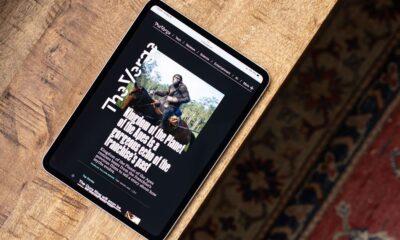
 Technology4 weeks ago
Technology4 weeks agoBest iPad deals for October 2024


You must be logged in to post a comment Login